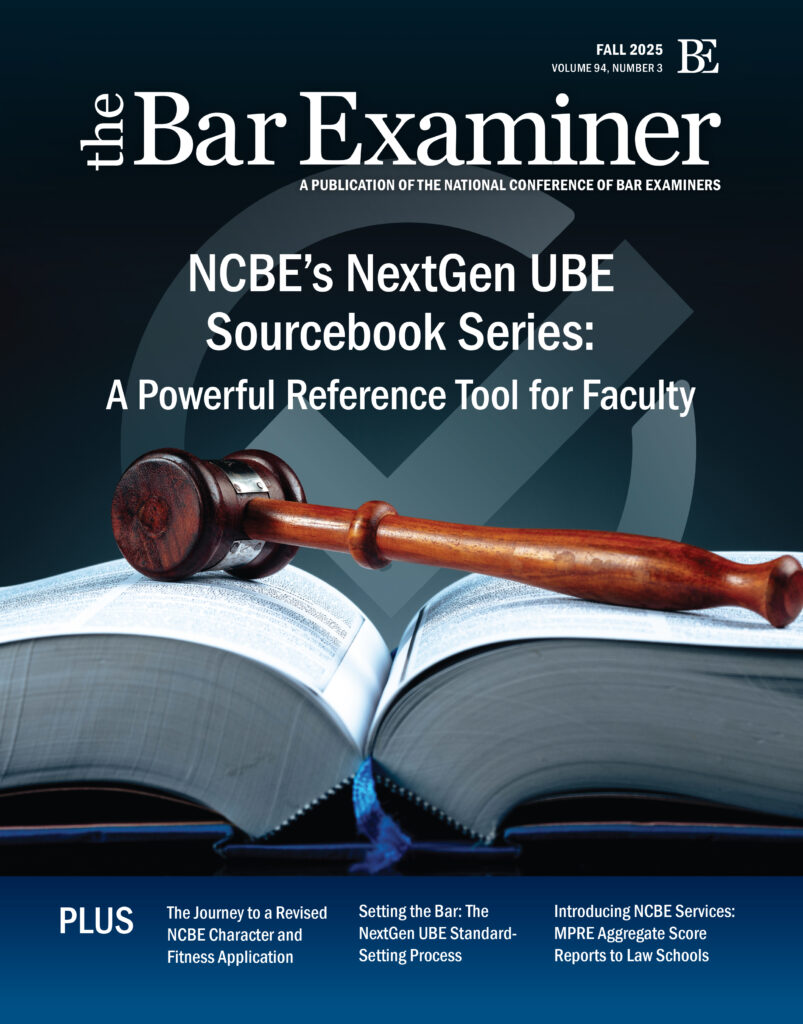This article originally appeared in The Bar Examiner print edition, September 2015 (Vol. 84, No. 3), pp 44–47. By Fred P. Parker III and Jessica GladBar Admission
Undocumented immigrants
In re Vargas, 10 N.Y.S.3d 579 (N.Y. App. Div. 2015)
The New York Supreme Court, Appellate Division, Second Department, has granted a law license to an undocumented immigrant authorized to be present in the United States under the federal government’s Deferred Action for Childhood Arrivals policy.
Cesar Adrian Vargas was born in Mexico in 1983 and brought into the United States without documentation when he was 5½ years old. He attended college and law school in New York City, and passed the New York bar examination. A court committee found that Vargas “appears to have stellar character,” but left it to the Court to decide whether his eligibility for admission was barred because of his undocumented immigration status.
Vargas is authorized to be in the United States under the Deferred Action for Childhood Arrivals (DACA) policy, which generally provides for prosecutorial discretion to defer removal action against certain individuals who came to the United States as children and without lawful documentation. A grant of deferred action does not confer lawful status; however, an individual whose case has been deferred is eligible to receive employment authorization for a period of two years, subject to renewal.
In a unanimous decision, the Appellate Division, Second Department, found “no legal impediment or rational basis for withholding the privilege of practicing law in the State of New York from undocumented immigrants who have been granted DACA relief.”
“We find that Mr. Vargas’[s] undocumented immigration status, in and of itself, does not reflect adversely upon his general fitness to practice law,” the decision states.
But the Court did not stop there. Federal law generally restricts an undocumented immigrant’s ability to obtain a professional license in the absence of the enactment of a state law opting out of the federal ban. However, the Court found that prescribing legislative enactment to opt out of the federal restrictions “unconstitutionally infringes on the sovereign authority of the state to divide power among its three coequal branches of government.”
“[W]e hold that the processes by which a state chooses to exercise, by one of its coequal branches of government, the authority granted by the federal legislation is not a legitimate concern of the federal government,” the decision states. “The ability, indeed the right, of the states to structure their governmental decision-making processes as they see fit is essential to the sovereignty protected by the Tenth Amendment.”
The Court found that the Tenth Amendment is implicated because “although Congress has left the ultimate determination whether to extend public benefits, including professional licensure, to the states, it has, at the same time, prescribed the mechanism by which the states may exercise that authority. Where, as here, New York, by its own legislative enactment, has determined that the state judiciary is the sovereign authority vested with the responsibility for formulating the eligibility qualifications and processes governing the admission of attorneys and counselors to the practice of law, that limitation cannot withstand scrutiny under the Tenth Amendment.”
Therefore, the Court held, “in light of this state’s allocation of authority to the judiciary to regulate the granting of professional licenses to practice law, . . . the judiciary may exercise its authority as the state sovereign to opt out of the [federal] restrictions . . . to the limited extent that those restrictions apply to the admission of attorneys to the practice of law in the State of New York.”
Character and Fitness
Conditional admission; grand theft; lack of candor; rehabilitation
Florida Board of Bar Examiners re J.R.B., 151 So. 3d 1218 (FL 2014)
J.R.B. graduated from law school in 2005 and passed the February 2006 Florida bar exam. His bar application reported the following criminal history: In 2002 he was found to have defrauded his former employer, Florida State University, of $54,046. He was found guilty of 5 felony counts of grand theft and also pled no contest to 45 counts of misdemeanor petit theft, reduced from felony charges of forgery and uttering. Adjudication was withheld. He was given an active sentence of five months with early termination upon restitution. J.R.B. served his jail time and paid restitution in full. Shortly before he received his law degree, his civil rights were restored. J.R.B. also reported filing for Chapter 7 bankruptcy in July 2004 and listed $40,210 in debt; those debts were discharged in November 2004.
Following review of J.R.B.’s file, the Florida Board of Bar Examiners called for an investigative hearing, and it was determined that specifications should be prepared and served on him. After J.R.B.’s answer was filed, the matter was resolved by consent judgment. In September 2006 the Board approved the consent judgment for a three-year denial of J.R.B.’s admission to the Florida Bar.
J.R.B. filed an updated application in October 2009 and reported that his employment as an online professor of Axia College of the University of Phoenix had been terminated in November 2007 because, according to J.R.B., a student who was not pleased with his comments on her assignment performed an Internet search of J.R.B.’s name, discovered articles about his arrest, and posted the articles and other material within the college’s online chat room. Axia College suspended him from teaching, and when he admitted that the information was accurate, he was removed from his position pending an investigation.
In March 2011 the Florida Board then filed a new specification for character and fitness for J.R.B.’s failure to disclose to the college that he was a convicted felon. Following an answer to the specification and a formal hearing, the Board found that J.R.B. had failed to establish rehabilitation and determined to withhold his admission for one year. At the end of the year he would submit a rehabilitation report to include his group therapy through Florida Lawyers Assistance and completion of 250 hours of community service. If the evidence was sufficient, the Board would recommend conditional admission. In October 2013 the Board reviewed J.R.B.’s statement of rehabilitation and recommended that he be conditionally admitted to the Florida Bar.
In considering the recommendation, the Court conducted an independent review of the record and found that J.R.B. has demonstrated a lifetime of dealing in falsehoods, that he lacks the ability to be truthful, and that he has no respect for the law. He stole money from his employer, which included funds for the university debate team, so his actions directly impacted students. He was guilty of 5 counts of grand theft and pled no contest to 45 counts of petit theft, and he had to resign from his position with the university in disgrace. His conviction for defrauding his employer occurred while he was in law school, and he was on probation until March 2004 and did not have his civil rights restored until shortly before he graduated. In addition, instead of attempting to meet his financial responsibilities, he filed for bankruptcy and claimed that his financial problems were due to resigning from employment in 2002. He then failed to tell Axia College about his criminal history. While terminated from this employment, he did not report this information to the Board until over two years later.
The Court stated that “no moral character qualification for Bar membership is more important than truthfulness and candor.” J.R.B.’s “misconduct mandates that he not be admitted to [the] Florida Bar now or at any time in the future.”
The Court stated that no motion for rehearing will be entertained.
Lack of candor; abuse of legal process; tainted letter of recommendation
Britton v. Bd. of Bar Examiners, 471 Mass. 1015, 29 N.E.3d 184 (MA 2015)
The Supreme Judicial Court of Massachusetts denied bar admission to an applicant who supported his Petition for Admission with a letter of recommendation written as a condition of a legal settlement.
Randy A. Britton petitioned for admission to the Massachusetts bar, and passed the July 2006 bar examination. After conducting an investigation and formal hearing, the Board of Bar Examiners determined that Britton lacked the character and fitness necessary to practice law in Massachusetts. A single justice of the Supreme Judicial Court upheld the determination, and the full Supreme Judicial Court affirmed.
The record “amply supports the board’s recommendation that the application be denied,” the decision states.
As to the tainted letter of recommendation, Britton disclosed that it had been written by an attorney who had obtained a criminal complaint against Britton and who Britton had sued. However, the board’s investigation revealed that Britton had failed to disclose that the criminal complaint was dismissed with an order that Britton pay restitution, and that the civil matter was settled under terms requiring the attorney to provide a positive letter of recommendation.
The board’s investigation also revealed that Britton had failed to accurately disclose two prior criminal charges, although neither charge resulted in a conviction. The board also found that Britton had failed to disclose a civil complaint he filed challenging the denial of a license to own assault weapons.
The board also found that Britton has a substantial history of filing largely unsuccessful pro se legal actions.
“Britton’s conduct in filing multiple lawsuits that have resulted in sanctions or orders to pay costs and fees and in repeatedly failing to comply with court orders demonstrates lack of respect for the judicial process,” the decision states. “Likewise, Britton’s failure to disclose relevant and material information, both in his application and during the board’s investigation, shows a marked lack of candor.”
The Court concluded that considerations of the public interest and the integrity of the bar raise significant doubts about Britton’s character, compelling the denial of his admission to the practice of law. “Britton’s disregard for the rules and standards by which the legal system operates and for which the legal process is structured, show his unwillingness to conduct himself with respect for the law and his inability to use sound judgment in conducting professional business.” A petition for rehearing was denied.
Readmission to the bar; rehabilitation
In re Shepard, 2015 Ark. 93, 457 S.W.3d 280 (AR 2015)
Jerry Hudson Shepard Jr. voluntarily surrendered his Arkansas law license in 2006 and now petitions the Court for readmission. Shepard was admitted to the bar in 1997 and was also licensed in Missouri. He surrendered his Missouri license in 2006 and was formally disbarred in that state in 2007.
Shepard’s petition to surrender arose from events occurring during his representation of client Richelle Allred, who was charged with first-degree murder, tampering with physical evidence, and obstruction of governmental operations in connection with the death of David Harkrider. The court granted Shepard immunity from prosecution in regard to the death of Harkrider and in regard to the bribery and intimidation of witnesses in this matter. The grant of immunity arose after Shepard refused to provide testimony to the prosecuting attorney regarding efforts to intimidate George Felice, a potential witness, and efforts to bribe Billy Garland to provide false testimony on Allred’s behalf. This grant of immunity required Shepard to voluntarily surrender his law licenses in Arkansas and Missouri, and he petitioned both courts to do so. In his petition, Shepard admitted that he had engaged in conduct involving dishonesty and that his conduct clearly constituted a serious crime.
In September 2012 Shepard filed his application for readmission to the Arkansas Bar with the Executive Secretary for the Arkansas State Board of Law Examiners, stating that he had surrendered his license for having an inappropriate relationship with a client who attempted to bribe someone she believed to be a witness. The Executive Secretary sent the material to the board chairman for review. The chairman, after reviewing the file, informed the Executive Secretary that Shepard was eligible for readmission upon passing the bar examination and that if he passed he would have to file a petition for readmission with the Supreme Court. Shepard passed the February 2014 Arkansas bar exam and filed his petition for readmission in April 2014.
In considering the petition, the Court said that “the overriding considerations on the question of readmission are the public interest [and] the integrity of the bar and the courts[,] with due consideration to the rehabilitation of the petitioner with respect to good moral character and mental and emotional stability.” The question before the Court was whether the grounds presented in Shepard’s voluntary surrender of his law license bar his readmission. The Court found that they do because Shepard’s conduct involved dishonesty and was prejudicial to the administration of justice. The Court added that it did not need to examine Shepard’s rehabilitation efforts since rehabilitation is pertinent only when an attorney is eligible for readmission. Shepard’s petition was denied.
 Fred P. Parker III is the retired Executive Director of the Board of Law Examiners of the State of North Carolina.
Fred P. Parker III is the retired Executive Director of the Board of Law Examiners of the State of North Carolina.

Jessica Glad is Staff Attorney for the National Conference of Bar Examiners.
Contact us to request a pdf file of the original article as it appeared in the print edition.







